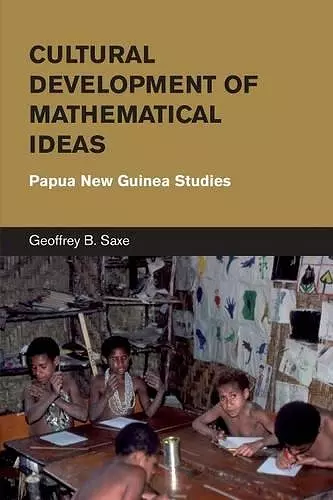Cultural Development of Mathematical Ideas
Papua New Guinea Studies
Format:Paperback
Publisher:Cambridge University Press
Published:6th Mar '14
Currently unavailable, and unfortunately no date known when it will be back
This paperback is available in another edition too:
- Hardback£110.00(9780521761666)

Geoffrey Saxe traces the emergence of numerical representations and ideas as people participate in collective practices of daily life.
Drawing upon field studies conducted in 1978, 1980 and 2001 with the Oksapmin, a remote Papua New Guinea group, Geoffrey B. Saxe traces the emergence of new forms of numerical representations and ideas in the social history of the community. In traditional life, the Oksapmin used a counting system that makes use of twenty-seven parts of the body; there is no evidence that the group used arithmetic in prehistory. As practices of economic exchange and schooling have shifted, children and adults unwittingly reproduced and altered the system in order to solve new kinds of numerical and arithmetical problems, a process that has led to new forms of collective representations in the community. While Dr Saxe's focus is on the Oksapmin, the insights and general framework he provides are useful for understanding shifting representational forms and emerging cognitive functions in any human community.
'Cultural anthropologist Clifford Geertz proposed that 'small facts speak to large issues' … In many ways, Geoffrey Saxe's new book echoes the Geertz quote. By gathering together the many small facts of numerical reasoning practices he has collected over a thirty-year period in a community in the Oksapmin region of Papua New Guinea, Saxe has assembled a dynamic documentary report of answers to the question: how are culture and cognition related? … At the end of this book, Saxe returns us to the Geertz quote … by suggesting that this culmination of thirty years of field work in Oksapmin mathematics makes three distinct contributions to the literature: thick description of a vanishing cultural community; little theory; and big theory … I would like to add that this important book provides a window into the professional career of a remarkable researcher and scholar.' Ellice A. Forman, Mathematical Thinking and Learning
'… [Saxe] highlights what the cognitive sciences can gain from anthropologically informed cognitive studies … such as deep insights into the construction and alteration of cognitive representations within the sociocultural context and its changing demands … the synopsis presented in this volume condenses a profound and impressive collection of about twenty-five years of research in a way that allows for deeper insights to be gained than the single papers could have done alone … A striking commonality in the chapters throughout this book is Saxe's focus on the tool-like character of the body-part system and how this tool is used and adapted purposefully to serve new functions. No matter whether or not one shares the theoretical framework on cognition and culture with Geoffrey Saxe, his detailed analyses and the broad contextualization open a fascinating window into the cultural development of numerical cognition.' Sieghard Beller, Ethos
'This book is a tour de force in moving theory toward a fully historical, social and activity based account of cultural and developmental change. The case presented is particular to an 'exotic' (to us) group, but the theoretical apparatus developed has wide-ranging application. This book isn't about 'them' it is about 'us' as well.' Joseph Glick, Human Development
'Saxe is a master of theory and method in human development, and he provides a model for how to conduct contextually grounded, theoretically useful, path-breaking research that moves the field forward.' Ashley E. Maynard, Journal of Cognition and Development
'Saxe's background chapters on his personal journey and his visits to Oksapmin and the historical background of currency changes in Papua New Guinea together with the carefully developed reports of each study and the overall linkage with his theoretical perspective make this an important contribution to psychology especially within the Pacific Rim region, and a crucial reference for those in Papua New Guinea interested in mathematics, education, cognition, psychology, anthropology and/or sociology.' Kay Owens, Journal of Pacific Rim Psychology
'… comprehensive and well documented … should appeal to a wide audience beyond cultural anthropology and cultural psychology … it will delight … this book should be of interest worldwide …' Pierre R. Dasen, Alterstice
'I can see at least three reasons why this book is a must-read for every mathematics education researcher. First, as an inexhaustible source of insights about numerical thinking and its development and also about human thinking in general, it can be trusted to provide the interested reader with a hearty serving of food for thought. Second, it is not every day that one sees a longitudinal study capturing a historical change in the making. This turns Saxe's story into something truly unique and precious. Finally, these [pages] of well-written text are too enjoyable a read to be missed.' Anna Sfard, Educational Studies in Mathematics
- Winner of Stirling Prize for Best Published Book in Psychological Anthropology, Society for Psychological Anthropology, American Anthropological Association 2014
- Winner of Eleanor E. Maccoby Book Award, American Psychological Association, Division 7 2015
- Winner of Best Authored Book Award, Cognitive Development Society 2013
ISBN: 9781107685697
Dimensions: 229mm x 152mm x 21mm
Weight: 530g
400 pages